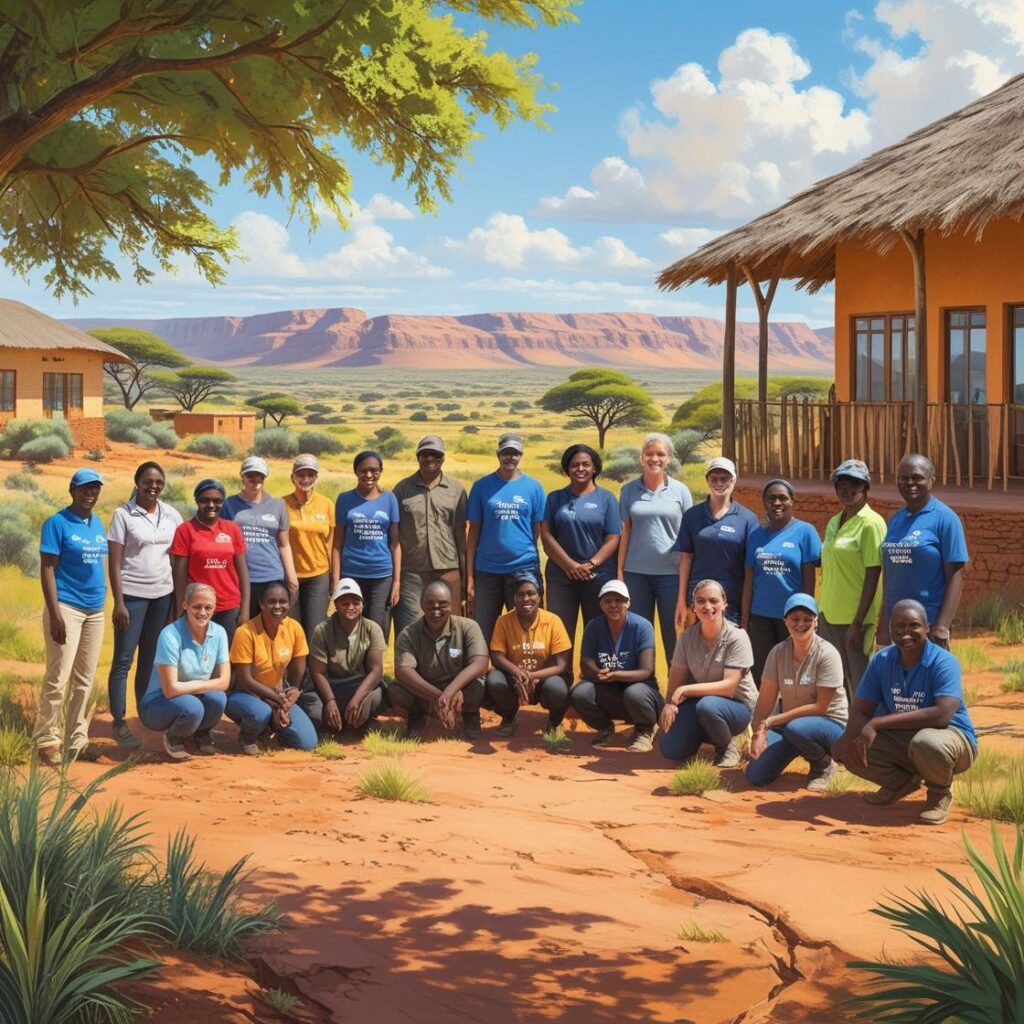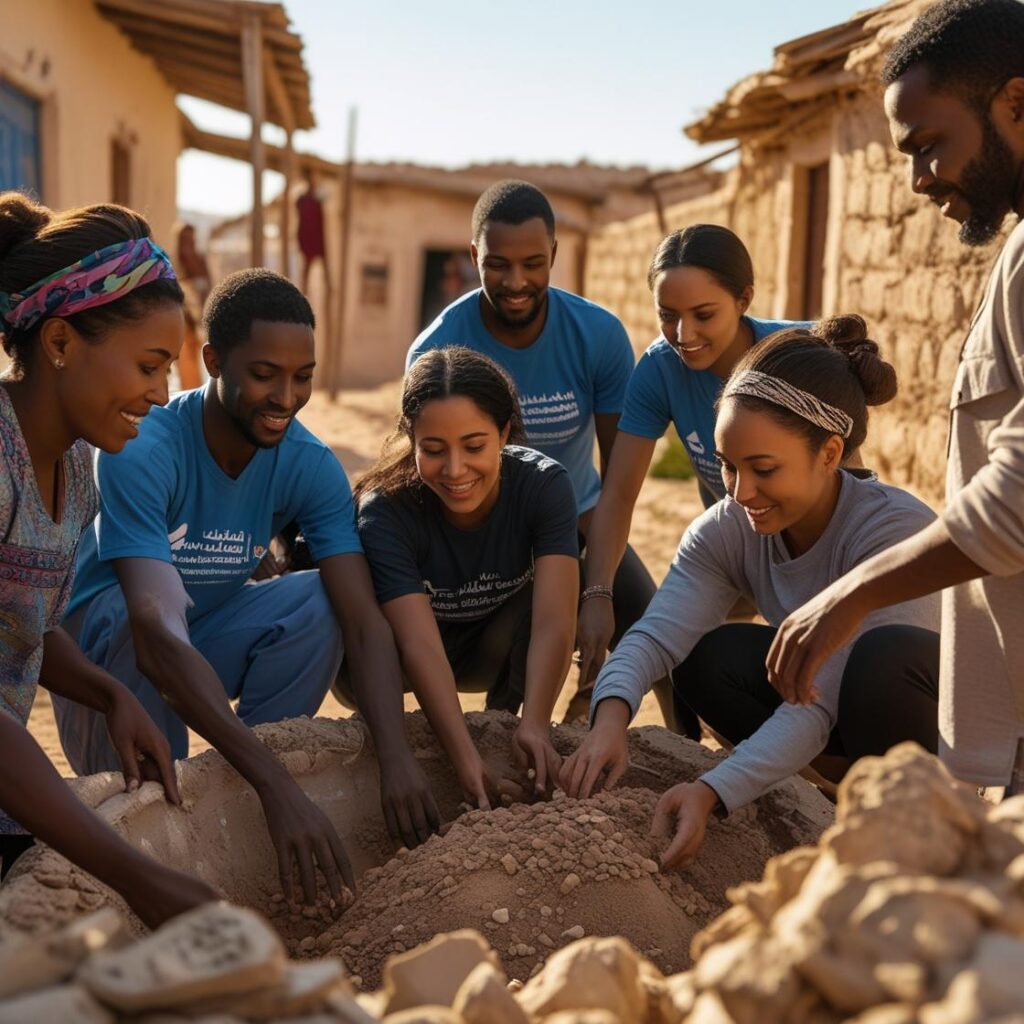يُتيح التطوع في بوتسوانا فرصةً فريدةً للمساهمة بشكلٍ فعّال في المجتمعات، والحفاظ على الحياة البرية، والتنمية المستدامة في واحدةٍ من أكثر دول أفريقيا استقرارًا سياسيًا وثراءً ثقافيًا. سواءً كنتَ شغوفًا بتعليم الأطفال، أو صحة المجتمع، أو الحفاظ على البيئة، فإن بوتسوانا تُقدّم برامج تطوعية تُناسب مجموعةً واسعةً من الاهتمامات والمهارات.
اقرأ أيضاً: التطوع في البحرين | كيف تصبح متطوعًا؟
1. لماذا التطوع في بوتسوانا؟
تتمتع بوتسوانا بسمعة طيبة في مجال الحكم الرشيد والرعاية البيئية مما يجعلها وجهة استثنائية للمتطوعين:
اقرأ أيضاً: التطوع في كندا | كيف تصبح متطوعًا؟
- بيئة مستقرة : منذ حصولها على الاستقلال في عام 1966، حافظت بوتسوانا على أحد أسرع الاقتصادات نمواً في أفريقيا، إلى جانب الديمقراطية المستقرة.
- نقطة ساخنة للتنوع البيولوجي : من دلتا أوكافانغو إلى صحراء كالاهاري، تستضيف النظم البيئية المتنوعة في بوتسوانا الفيلة والأسود وأفراس النهر والمزيد – وهي مثالية للمتطوعين المهتمين بالحفاظ على البيئة.
- الثراء الثقافي : مع كون اللغة السيتسوانية هي اللغة الوطنية وأكثر من اثنتي عشرة مجموعة عرقية، يكتسب المتطوعون تجارب ثقافية غامرة أثناء المساهمة في الاحتياجات المحلية.
إن التطوع هنا لا يدعم القضايا المهمة فحسب، بل يعزز أيضًا التفاهم بين الثقافات والنمو الشخصي.
اقرأ أيضاً: التطوع في النمسا | كيف تصبح متطوعًا؟
2. نظرة عامة على فرص التطوع
بشكل عام، تنقسم برامج التطوع في بوتسوانا إلى ثلاث فئات:
اقرأ أيضاً: التطوع في بلجيكا | كيف تصبح متطوعًا؟
- تنمية المجتمع
- التعليم والمساعدة التدريسية
- تمكين المرأة والتمويل الأصغر
- البنية التحتية والصرف الصحي للمياه
- الرعاية الصحية والصحة العامة
- دعم العيادة والتوعية
- برامج الوقاية من فيروس نقص المناعة البشرية/الإيدز والتغذية
- مبادرات صحة الأم والطفل
- الحياة البرية والحفاظ على البيئة
- دوريات مكافحة الصيد الجائر ومراقبة الحياة البرية
- إعادة تأهيل الموائل والبحث
- مشاريع السياحة البيئية المجتمعية
تقدم العديد من المنظمات حزمًا مخصصة، حتى يتمكن المتطوعون الطموحون من مواءمة مهاراتهم واهتماماتهم مع أهداف البرنامج.
اقرأ أيضاً: التطوع في البرازيل | كيف تصبح متطوعًا؟
3. برامج التطوع الشعبية
وفيما يلي بعض البرامج التطوعية الأكثر طلبًا في بوتسوانا:
اقرأ أيضاً: التطوع في كولومبيا | كيف تصبح متطوعًا؟
أ. التدريس في المدارس ذات الموارد المحدودة
يساعد المتطوعون المعلمين المحليين في مواد مثل اللغة الإنجليزية والرياضيات والعلوم. غالبًا ما تشمل مسؤولياتهم تخطيط الدروس، والدروس الخصوصية، والأنشطة اللامنهجية.
اقرأ أيضاً: التطوع في فنلندا | كيف تصبح متطوعًا؟
ب. دعم التعليم في مرحلة الطفولة المبكرة
في القرى الريفية، تستفيد المدارس الابتدائية ومراكز الرعاية النهارية من المتطوعين الذين يقومون بتصميم ألعاب تعليمية تفاعلية وتعليم القراءة والكتابة الأساسية.
اقرأ أيضاً: التطوع في فرنسا | كيف تصبح متطوعًا؟
ج. مساعدة العيادات والمستشفيات
يعمل المتطوعون تحت إشراف متخصصين صحيين محليين، ويساعدون في حفظ السجلات، وتثقيف المرضى، والرعاية الأساسية – وخاصة في المراكز الصحية النائية.
اقرأ أيضاً: التطوع في اليونان | كيف تصبح متطوعًا؟
د. مراقبة الحياة البرية والبحث فيها
ينضم المشاركون إلى حراس الغابات في تتبع تحركات الحيوانات، وتسجيل البيانات حول أحجام السكان، والمساعدة في مشاريع البحث الميداني، وخاصة في المحميات الخاصة.
اقرأ أيضاً: التطوع في إندونيسيا | كيف تصبح متطوعًا؟
هـ. ورش عمل الصحة المجتمعية
تركز برامج التوعية على التوعية بفيروس نقص المناعة البشرية/الإيدز، والتثقيف الغذائي، وأفضل ممارسات الصرف الصحي، مع قيام المتطوعين بتيسير ورش العمل وتوزيع المواد.
اقرأ أيضاً: التطوع في ماليزيا | كيف تصبح متطوعًا؟
يختلف كل برنامج من حيث المدة – من أسبوعين إلى ستة أشهر – وغالبًا ما يتضمن الإقامة مع العائلات أو السكن التطوعي المشترك.
اقرأ أيضاً: التطوع في أستراليا | كيف تصبح متطوعًا؟
4. المتطلبات والمؤهلات
في حين أن المتطلبات المحددة تعتمد على المنظمة، فإن معظم البرامج تطلب:
اقرأ أيضاً: التطوع في بلغاريا | كيف تصبح متطوعًا؟
- الحد الأدنى للعمر : عادة 18 عامًا (بعض البرامج تقبل 17 عامًا بموافقة الوالدين).
- الكفاءة اللغوية : إتقان اللغة الإنجليزية أمر ضروري؛ اللغة السيتسوانية الأساسية مفيدة ولكنها ليست إلزامية.
- الخلفية التعليمية : شهادة الثانوية العامة أو درجة جامعية أو دورات دراسية ذات صلة بأدوار التدريس أو الرعاية الصحية.
- الخبرة : تعتبر الخبرة السابقة في العمل التطوعي أو التدريس أو الرعاية الصحية مفيدة للأدوار المتخصصة.
- الموافقات الصحية : التطعيمات الحديثة (الحمى الصفراء، والتيفوئيد، والتهاب الكبد A / B) والوقاية من الملاريا.
- التحقق من الخلفية الجنائية : مطلوب للبرامج التي تشمل الفئات السكانية الضعيفة، مثل الأطفال أو المرضى.
قد تقوم المنظمات بإجراء مقابلات لتقييم دوافعك وقدرتك على التكيف وحساسيتك الثقافية.
اقرأ أيضاً: التطوع في تشيلي | كيف تصبح متطوعًا؟
5. عملية التقديم
يتضمن أن تصبح متطوعًا عادةً الخطوات التالية:
اقرأ أيضاً: التطوع في قبرص | كيف تصبح متطوعًا؟
- البحث واختيار البرنامج
- حدد مجال اهتمامك والموقع المفضل في بوتسوانا.
- قارن بين سمعة المنظمات ورسومها وخدمات الدعم الخاصة بها.
- إرسال الاستفسار الأولي
- أكمل نموذجًا عبر الإنترنت أو أرسل بريدًا إلكترونيًا يعبر عن خلفيتك وتوافرك وتفضيلاتك للبرنامج.
- طلب رسمي كامل
- قم بتقديم التفاصيل الشخصية والتاريخ التعليمي والمهني والمراجع.
- قم بتحميل نسخ ممسوحة ضوئيًا من جواز السفر والسيرة الذاتية والتحقق من الخلفية الجنائية.
- المشاركة في المقابلة
- مقابلة فيديو أو هاتفية لمناقشة التوقعات والمسؤوليات والترتيبات اللوجستية.
- تلقي حزمة القبول والمعلومات
- خطاب القبول الرسمي، ومسار البرنامج، وقائمة التعبئة، ومواد الإحاطة قبل المغادرة.
- إتمام عملية التسجيل والدفع
- دفع رسوم البرنامج (غالبًا على أقساط).
- تنسيق تأمين السفر وحجوزات الطيران وأي متطلبات تأشيرة.
من المستحسن أن تبدأ العملية قبل ثلاثة أشهر على الأقل من تاريخ سفرك المقصود للسماح بوقت كافٍ لمعالجة التأشيرة والتطعيمات.
اقرأ أيضاً: التطوع في إستونيا | كيف تصبح متطوعًا؟
6. التكاليف وخيارات التمويل
تتراوح رسوم برامج التطوع في بوتسوانا عادةً من 1200 دولار أمريكي إلى 3500 دولار أمريكي للدورات التي تتراوح مدتها من أسبوعين إلى أربعة أسابيع، وتغطي:
اقرأ أيضاً: التطوع في آيسلندا | كيف تصبح متطوعًا؟
- الإقامة (عائلة مضيفة أو منزل متطوع)
- ثلاث وجبات في اليوم (غالبًا من المطبخ المحلي)
- الاستقبال والتوصيل من المطار
- التوجيه الداخلي والأنشطة الثقافية
- دعم محلي على مدار الساعة طوال أيام الأسبوع
تشمل النفقات الإضافية ما يلي:
اقرأ أيضاً: التطوع في موناكو | كيف تصبح متطوعًا؟
- الرحلات الدولية : 800-1500 دولار أمريكي (حسب المنشأ)
- رسوم التأشيرة : حوالي 65 دولارًا أمريكيًا لتأشيرة زيارة دخول واحدة (صالحة لمدة تصل إلى 90 يومًا)
- تأمين السفر : 50-100 دولار أمريكي للتغطية الأساسية لمدة شهر واحد
- التطعيمات والوقاية من الملاريا : 200-400 دولار أمريكي
التمويل والمنح الدراسية
- منح المتطوعين : تقدم منظمات مثل مؤسسة الشباب الدولية منحًا صغيرة.
- التمويل الجماعي : يمكن أن تساعد المنصات مثل GoFundMe في جمع الأموال من الأصدقاء والعائلة.
- الائتمان الجامعي : تسمح لك بعض المؤسسات الأكاديمية بالحصول على ائتمان أثناء التطوع في الخارج – تحقق مع مكتب الدراسة في الخارج.
- دعم صاحب العمل : الاستفسار عن برامج التطوع في الشركات أو فرص الحصول على الراتب إذا كنت موظفًا.
إن التخطيط المبكر للميزانية واستكشاف مصادر التمويل المتعددة يمكن أن يجعل رحلتك التطوعية أكثر تكلفة.
اقرأ أيضاً: التطوع في ألمانيا | كيف تصبح متطوعًا؟
7. الاستعداد لرحلتك
يضمن التحضير المناسب تجربة تطوعية سلسة ومؤثرة:
اقرأ أيضاً: التطوع في بليز | كيف تصبح متطوعًا؟
أ. التوثيق
- جواز السفر : صالح لمدة ستة أشهر على الأقل بعد تاريخ مغادرتك بوتسوانا.
- التأشيرة : قم بالتقديم من خلال سفارة أو قنصلية بوتسوانا المحلية؛ قد تكون خيارات التأشيرة الإلكترونية متاحة.
- التأمين : تأمين شامل للسفر والطب مع تغطية الإخلاء.
ب. الاحتياطات الصحية
- حدد موعدًا لزيارة عيادة طب السفر قبل 6 إلى 8 أسابيع من المغادرة.
- احصل على التطعيمات اللازمة والوقاية من الملاريا؛ واحمل معك مجموعة أدوات الإسعافات الأولية الأساسية.
ج. الإعداد الثقافي
- تعلم اللغة الإنجليزية الأساسية : تحيات مثل “مرحبا” و”شكرا لك” لها تأثير كبير.
- اقرأ عن العادات المحلية : تعرف على المعايير الاجتماعية المتعلقة باللباس والتحية والضيافة.
د. قائمة التعبئة
- ملابس خفيفة الوزن وجيدة التهوية (أكمام طويلة وسراويل للحماية من الشمس والبعوض).
- واقي من الشمس، طارد للحشرات مع مادة DEET، وزجاجة مياه قابلة لإعادة الاستخدام.
- هدايا للمجتمع المضيف (اللوازم المدرسية، والأشياء الصغيرة للأطفال).
ستعمل قائمة التحقق الشاملة قبل المغادرة على تقليل العقبات غير المتوقعة.
اقرأ أيضاً: التطوع في الصين | كيف تصبح متطوعًا؟
8. الاعتبارات الثقافية واللغة
إن احترام الثقافة المحلية يعزز التفاهم المتبادل:
اقرأ أيضاً: التطوع في الكاميرون | كيف تصبح متطوعًا؟
- آداب التحية : المصافحة والابتسامة، والاستفسار عن الصحة والأسرة كعلامة على الاحترام.
- قواعد اللباس : ارتداء ملابس محتشمة، خاصة في المناطق الريفية – تجنب السراويل القصيرة فوق الركبة والقمصان بدون أكمام.
- الالتزام بالمواعيد : تعمل بوتسوانا وفقًا لـ”توقيت بوتسوانا”، والذي يمكن أن يكون أكثر مرونة؛ لذا كن صبورًا ومرنًا.
- اللغة : في حين أن اللغة الإنجليزية هي لغة الأعمال الرسمية، فإن تعلم العبارات السيتسوانية يوضح التقدير الثقافي ويبني التفاهم.
يساعد التواصل مع الأسر المضيفة وأعضاء المجتمع على سد الفجوات الثقافية.
اقرأ أيضاً: التطوع في جمهورية أفريقيا الوسطى | كيف تصبح متطوعًا؟
9. احتياطات السلامة والصحة
بوتسوانا آمنة نسبيًا، ولكن هناك احتياطات قياسية يجب اتخاذها:
اقرأ أيضاً: التطوع في الجزائر | كيف تصبح متطوعًا؟
- الأمن الشخصي : يمكن أن تحدث السرقات البسيطة في المناطق الحضرية؛ لذا احرص على تأمين الأشياء الثمينة وتجنب المشي بمفردك في الليل.
- السلامة على الطرق : قد تكون الطرق خارج المدن الكبرى غير ممهدة؛ لذا استخدم خدمات النقل ذات السمعة الطيبة.
- التوعية بالحياة البرية : حافظ على مسافة آمنة من الحيوانات البرية واتبع إرشادات حراس الغابات في المحميات.
- البروتوكولات الصحية : اشرب المياه المعبأة أو المفلترة؛ تجنب الثلج في المشروبات التي تباع في الشارع إذا لم تكن متأكدًا من المصدر.
احصل على معلومات عن طريق منسق البرنامج في بلدك وأحدث تحذيرات السفر.
10. إحداث تأثير دائم
ولضمان أن تطوعك يترك إرثًا إيجابيًا ومستدامًا:
- التعاون بشكل وثيق مع السكان المحليين
- التعاون مع قادة المجتمع في إنشاء مشاريع لمعالجة الاحتياجات الحقيقية بدلاً من فرض أفكار خارجية.
- مهارات النقل
- التركيز على تدريب وتوجيه السكان المحليين حتى تستمر البرامج بعد مغادرتك.
- احترم المعرفة المحلية
- تقدير الممارسات التقليدية ودمجها في تخطيط المشاريع حيثما كان ذلك مناسبًا.
- المتابعة
- حافظ على التواصل مع المنظمات المضيفة؛ وقدم الدعم أو الموارد عن بعد عندما يكون ذلك ممكنًا.
- التأمل والمشاركة
- قم بتوثيق تجاربك لزيادة الوعي بين شبكتك وإلهام المتطوعين في المستقبل.
إن التطوع المستدام يعطي الأولوية للتمكين على الاعتماد على الآخرين.
خاتمة
يُقدّم التطوع في بوتسوانا تجربةً قيّمةً لك وللمجتمعات التي تخدمها، من خلال مشاريع قيّمة في مجالات التعليم والرعاية الصحية والحفاظ على البيئة. باختيار برنامجك بعناية، وتلبية جميع المتطلبات، والتحضير الجيد، يُمكنك تعظيم أثرك واندماجك الثقافي. انتهز الفرصة، واحترم العادات والتقاليد المحلية، والتزم بالاستدامة لترك إرثٍ يدوم.



